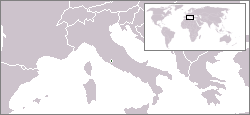This article needs to be updated.(December 2012) |
State of the Vatican City Stato della Città del Vaticano(in Italian) | |
|---|---|
 | |
| ISO 3166 code | VA |
The Vatican City, even though not a member of the European Union, is a member of the Eurozone. Since 2002, it has had a special agreement with the EU that allows this microstate to mint a limited number of euro coins. These are limited specifically to commemorative coins made of silver and other precious and semi-precious metals minted by the Vatican City, and do not include pre-2002 commemorative coins. [1] [2] [3] [4]
Contents
- 2002 Coinage
- 2003 Coinage
- 2004 Coinage
- 2005 Coinage
- 2006 Coinage
- 2007 Coinage
- 2008 Coinage
- Notes
- References
